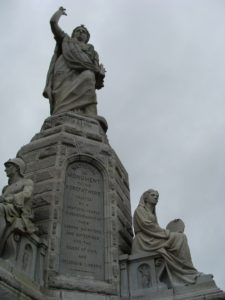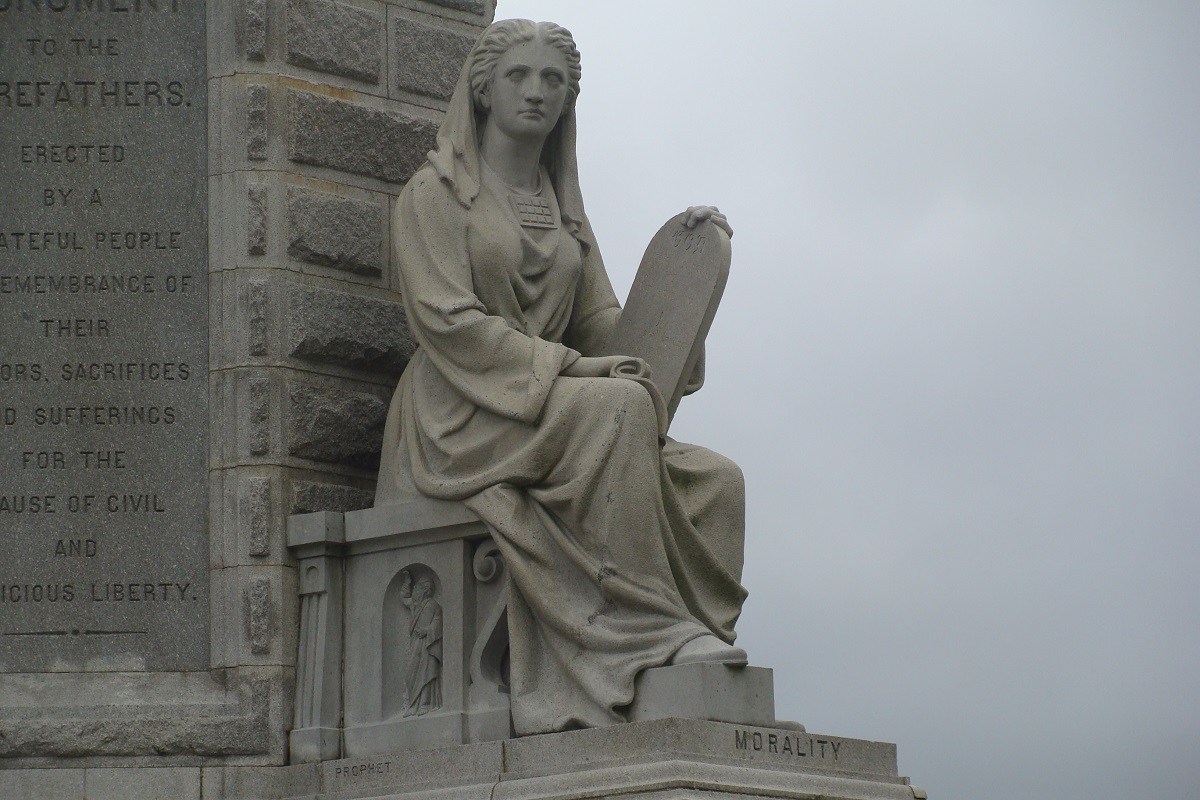© 2021 Don Pinson | [Download]
(Link not working? Right-click and select “Save As”.)
 Forefathers Monument, in Plymouth, Massachusetts, is dedicated to the memory of the Pilgrims: Specifically to the memory of, “…their labors, sufferings, and sacrifices in the cause of civil and religious liberty.” One of the five statues which make up Forefathers Monument is Morality. This statue reveals the Pilgrims desire to live conforming their actions to the Bible. They demonstrated how Christ could live His life through us if we were surrendered to Him as a living Master. And that was true in hard times as well as good times. Their story shows us this reality—even in the most difficult circumstances.
Forefathers Monument, in Plymouth, Massachusetts, is dedicated to the memory of the Pilgrims: Specifically to the memory of, “…their labors, sufferings, and sacrifices in the cause of civil and religious liberty.” One of the five statues which make up Forefathers Monument is Morality. This statue reveals the Pilgrims desire to live conforming their actions to the Bible. They demonstrated how Christ could live His life through us if we were surrendered to Him as a living Master. And that was true in hard times as well as good times. Their story shows us this reality—even in the most difficult circumstances.
When they came together in a church covenant in 1605 to: “…walk together in all His ways…whatsoever it should cost them…” (Bradford, William. Of Plimoth Plantation), it would cost them dearly. Several times over the next three years, English deputies would burst into their worship meetings, hauling the men off to jail; fining them and keeping them locked up for thirty days. This cost them financially because they were unable to work their farms during those times.
When they moved to Holland in order to have the religious freedom to teach their children the ways of Christ, they were oppressed economically by the Dutch labor laws. Those bad laws would ultimately cause them to lose some of their children to the liberal thinking of the Dutch society, and that was the most difficult thing they ever faced. Yet they didn’t give up the dream of being able to teach the rest of their children the Gospel of Christ.
When they boarded the Mayflower to come to America to have the liberty to teach their children the truth, they were oppressed by the sailors on the Mayflower. Yet they chose to endure this with patience and forgiveness toward the sailors.
The weather dealt them cruel experiences on their voyage, storms nearly sinking the ship many times. They were forced to live crammed into the middle deck while most of them were very seasick. These very unsanitary conditions made the atmosphere miserable, but yet they persevered and worshiped God together every morning and evening.
Once here, it became very difficult to find a place to live. When finally a storm (which they believed was the Hand of God) blew them into Plymouth Bay and they found a place to live, the winter cold made it really difficult to build their houses. They started dying from exposure to the cold and poor food supplies. Half of them would die that first winter.

But—they overcame it all by the indwelling Life of Jesus Christ. And even though Captain Jones begged them to return with him to England the next spring, they choose to stay and keep trusting their God to enable them to build a community here which would live by the Bible; a community which would teach their children in their schools both the message of their redemption through Jesus Christ, and all the academic subjects as being rooted in Christ. Were they able to do it? After living here for twenty-five years, William Bradford, their Governor for thirty-five years, would write their history. Here was how he summed up their experience here:
“Thus out of small beginnings greater things have been produced by His hand that made all things of nothing, and gives being to all things that are; and, as one small candle may light a thousand, so the light here kindled hath shone unto many, yea in some sort to our whole nation; let the glorious name of Jehovah have all the praise.”
(Bradford, William. 1650, in his work entitled, The History of Plymouth Plantation 1608-1650 (Boston, Massachusetts: Massachusetts Historical Society, 1856 | Boston, Massachusetts: Wright and Potter Printing Company, 1898 | Bulverde, Texas: American Heritage Classics, Mantle Ministries, 1988), p. 236.)
Can your life be described as, “…Christ in you the hope of glory” (Colossians 1:27), as, indeed, the Pilgrims’ life could?
Think about it; because if you don’t, someone else will do your thinking for you—and for your children! And you won’t like what that brings to you. I’m Don Pinson; this has been Think About It.
